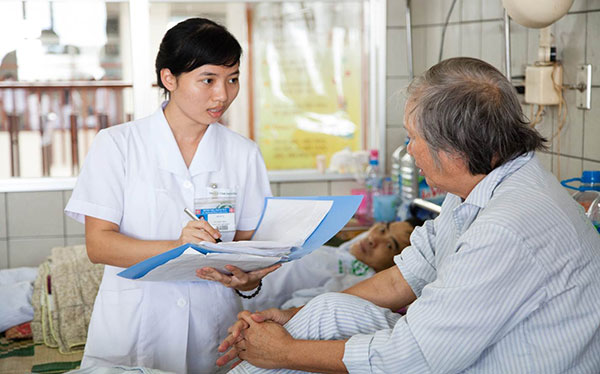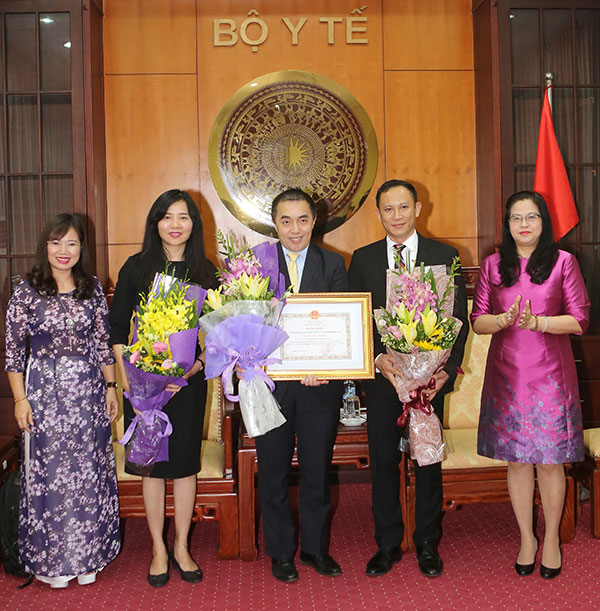Aging population: Opportunities and challenges to APEC economies
 |
Besides the contributions of government officials, experts, and researchers hailing from APEC economies and international organisations, Abbott - as the Platinum Sponsor for the APEC CEO Summit 2017 and a global healthcare company - constantly works to accompany Vietnam on the journey to confront challenges posed by the fast aging population.
Preparations and initiatives are essential for building a healthy community for the elderly
According to the General Office for Population and Family Planning under the Ministry of Health (MoH), Vietnam is currently home to about 10.1 million seniors, two million of whom are aged above 80. Vietnam officially entered the aging phase of the population since 2011 and is one of the countries whose population ages at the fastest pace.
 |
Not only Vietnam, many other nations are facing similar challenges. Particularly, though APEC economies account for 40.5 per cent of the world’s population, their seniors make up nearly 50 per cent of the total, and most APEC member countries are confronting challenges associated with aging population.
With the current pace, elderly people are forecasted to make up 18 per cent of the Vietnamese population by 2030, and the rate will touch 26 per cent by 2050. The aging population is not yet
a burden to the economy, but without careful preparation and pragmatic initiatives, it stands to have big social and economic impacts, impairing economic growth, investment, labour, healthcare, social well-being and infrastructure design.
 |
For instance, though the average life expectancy of Vietnamese people nowstands at 73.4 years,each Vietnamese person has an average of 15.3 years spent confronting diseases in their lives.
Senior Vietnamese citizens also cope with dual burdens from fighting multiple diseases simultaneously, particularly chronic ones (diabetes, hypertension, etc.), and malnutrition due to changing nutrition needs, whereas suitable quality healthcare products and services are in short supply.
As the host country of the APEC 2017, Vietnam has set promoting healthy aging and looking towards a healthy Asia-Pacific as one of the APEC 2017 priorities. The demand for nutrition and medical support of the elderly has become an issue of international magnitude and a concern to government leaders, researchers, and businesses regionally.
Abbott: accompanying Vietnam’s journey towards healthy aging
Having a healthy life to be able to achieve one’s highest potential is the dream of all people.
Forty-eight per cent of Vietnamese people regard having good health as their biggest aspiration.
Through actively supporting Vietnam’s priorities at the APEC 2017, including healthy aging, Abbott is one of the companies having initiatives and making contributions that are linked to the overall goals and objectives of MoH.
Abbott’s approach to healthy aging focuses on helping to orient a suitable healthcare system that matches the needs of the elderly, creating conducive environment for the elderly, and method improvement, supervision and increased understanding of the elderly.
In Vietnam, over the past couple of years, Abbott has been recognised as one of the pioneers paying great attention to the health of the elderly and helping people (including seniors) live their best life through the power of health.
A global healthcare company, Abbott has been carrying out wide-ranging scientific research and application activities to improve health and nutrition status for the elderly.
Many well-known nutritional products, such as Ensure Gold and Glucerna, were tailored to the nutritional needs of people aged above 50 or those with special nutritional needs. These products were the results of focused scientific research and have become familiar to most Vietnamese families.
Over the last years, Abbott has various initiatives to improve health and well-being of elderly people in the country ranging from becoming strategic partner with MoH to implement exemplary programme on improving the quality of clinical nutrition in hospitals across Vietnam (VN QIP), establishing Abbott Fund Institute of Nutrition Science (AFINS) from 2010 to train up to 2,400 professionals on nutrition, to providing free health checks to the elderly.
In the VN QIP project, Abbott focuses on building a programme on improving clinical nutrition in Vietnam hospitals, including nutritional screening tools and the processes assessing patients’ nutrition needs at hospitals. Additionally, the programme will provide training and guidance on VN QIP practice processes and clinical nutritional processes for healthcare professionals at Vietnamese hospitals.
The VN QIP programme has now been applied at seven key national hospitals across the country, bringing immense practical benefits to patients, a significant proportion of whom being elderly.
Several programmes of great significance to the community, like the Dream campaign that has inspired seniors to fulfil unmet dreams and live a full life thanks to strength enhanced, have reached millions of Vietnamese people during 2016-2017. These are effective measures helping Vietnam to tackle the challenge posed by the growing elderly population. By leveraging its extensive expertise in nutrition, as well as other areas of healthcare, Abbott has been able to have a meaningful impact on the public healthcare across the globe. The company remains committed to investing in the long-term health of Vietnam and sees many more opportunities for partnerships and developments in the future.
What the stars mean:
★ Poor ★ ★ Promising ★★★ Good ★★★★ Very good ★★★★★ Exceptional
Latest News
More News
- Vietnam: A land of milk, honey, and concrete (November 12, 2017 | 18:05)
- APEC week boosts Vietnam’s appeal (November 12, 2017 | 17:56)
- APEC minister vow to boost co-operation (November 11, 2017 | 14:00)
- Japanese firms sign $5-billion raft of deals with Vietnam (November 10, 2017 | 11:00)
- First VBS kicked off in Danang (November 07, 2017 | 17:10)
- Ford’s continuing efforts to make Vietnam’s roads safer (November 07, 2017 | 16:08)
- Viet Nam is trying to improve itself: PM (November 07, 2017 | 15:34)
- PM delivers keynote speech at Viet Nam Business Summit (November 07, 2017 | 11:34)
- APEC Vietnam 2017 special publication now available (November 07, 2017 | 11:32)
- Four Vietnamese entrepreneurs to attend APEC CEO Summit (November 06, 2017 | 20:38)












 Mobile Version
Mobile Version